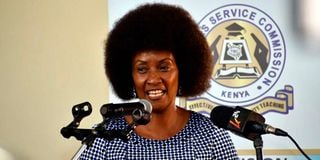Premium
14,460 jobs up for grabs as TSC fills staffing gaps

Teachers Service Commission Chief Executive Officer Nancy Macharia speaks during the launch of the competency-based curriculum training for over 60,000 secondary school teachers on April 26, 2022. TSC seeks to employ 14,460 tutors to fill staffing gaps in schools.
The Teachers Service Commission seeks to employ 14,460 teachers – the highest number in recent times – as it grapples with fixing the acute shortage of tutors in public primary and secondary schools.
The commission has declared 5,000 new vacancies that it intends to fill next month and 8,230 others to replace teachers who have exited service through natural attrition.
It will apply affirmative action in recruitment for schools in Garissa, Mandera and Wajir counties, which are greatly under-staffed and shunned by many because of security concerns.
Of the new vacancies, 3,972 will go to secondary schools to help cope with the shortage created by 100 per cent transition policy, 1,000 to primary institutions while teacher training colleges will get 28 tutors. They will be recruited under permanent and pensionable terms of service.
TSC was allocated Sh298.4 billion in the current budget, Sh2.5 billion of which is for the recruitment of new teachers and Sh1.2 billion for hiring of interns on contractual basis. It is yet to advertise the internship positions.
To fill vacancies that have been left vacant by exits, the commission will recruit 6,539 teachers for primary and 1,691 others for secondary schools. These too will be on permanent and pensionable terms.
TSC has lined up 844 permanent positions for schools in the north. Through affirmative action, the jobs are earmarked for teachers from the region. This is a re-advertisement after the commission failed to get enough teachers in a previous recruitment drive. Primary schools will get 764 teachers while 80 will be posted to secondary institutions.
“To qualify for recruitment, a candidate must be teaching under board of management in Garissa, Mandera or Wajir counties, if not hailing from the three counties,” said Ms Nancy Macharia, the TSC chief executive.
The move is meant to encourage teachers from the region to apply. In the past, teachers from other regions have shunned working there over insecurity while unions have advocated for posting of local tutors. In addition, 386 contract teachers will be engaged.
The fate of unemployed teachers has become a hot campaign topic, with Azimio la Umoja-One Kenya presidential candidate Raila Odinga promising to hire the over 300,000 jobless tutors. Deputy President William Ruto of the Kenya Kwanza Alliance has promised to employ 116,000 teachers in two years.
To qualify for recruitment, all candidates must be registered with the TSC. Those applying to teach in a primary school need to have a P1 certificate as the minimum qualification. Applicants for secondary school jobs must have a diploma in education while those targeting TTCs need a Bachelor of Education degree.
Candidates have until July 7 to apply online through the TSC website www.tsc.go.ke under ‘Careers’ or teachersonline.tsc.go.ke. There will be no manual applications. Dr Macharia said the shortlisted candidates, interview dates and venues will be published on the TSC website by July 15. They will then be expected to present original academic and professional certificates during the interview.
“Successful candidates will be posted to serve in any part of the country and not necessarily in the county or school where they were interviewed,” she said.
Dr Macharia added that the merit lists that will be generated during the recruitment exercise will be used in subsequent recruitment processes within the financial year.
The employment of the new teachers will still leave many jobless and schools not adequately staffed. Secondary schools are worst hit as they need over 60,000 teachers while in primary, there’s a shortage of close to 50,000 tutors.
The commission blames the shortage on the mushrooming of schools and the challenges of implementing the 100 per cent transition policy.




